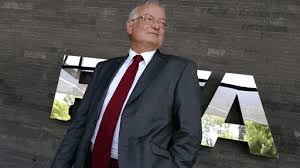By Andrew Warshaw and Paul Nicholson
November 18 – In another dramatic twist in the 2018 and 2022 World Cup investigation into possible corruption in the bidding process, FIFA has lodged a criminal complaint against a number of individuals (“persons”) with the Office of the Attorney General of Switzerland in Berne.
It is not known how many individuals are named in the complaint but it is believed it could be at least five, possibly more. Their identities will remain confidential while the investigation is taking place, indeed, it is unlikely that they will have yet had it confirmed that they are the subject of criminal investigation in Switzerland.
By referring the cases to the civil authorities in Switzerland FIFA has opened up the possibility for investigation of individuals who would not have been bound by FIFA laws, as well as those that could be sanctioned by the governing body. As a criminal case the stakes have been raised beyond just being a football matter and point to far more serious attempts at influencing the vote than just corridor meetings and pressurising individuals.
In his summation of Garcia’s report last week, FIFA ethics judge Hans-Joachim Eckert said there was not sufficient evidence arising from the investigation to believe the integrity of the vote was compromised – meaning there would be no stripping of hosting rights or a revote, and that Russia and Qatar would proceed to host the 2018 and 2022 World Cups.
But Eckert did point to a number of breaches of rules by individuals and that he expected the Investigatory Chamber to initiate proceedings against these individuals. It now seems he was not prepared to wait for the Investigatory Chamber to swing back into action but has pushed the pace of investigation.
“There seem to be grounds for suspicion that, in isolated cases, international transfers of assets with connections to Switzerland took place, which merit examination by the criminal prosecution authorities,” FIFA said in a statement.
Although Eckert’s summary has caused a storm of protest, FIFA president Sepp Blatter says it is right to resist calls to make the full report public. “We have examined this matter very carefully from a legal point of view,” he said.
“The result was clear: If FIFA were to publish the report, we would be violating our own association law as well as state law.”
Within hours of Eckert’s summary being released last week, Garcia, the US prosecutor who conducted a two-year inquiry into claims of wrongdoing, complained that Eckert’s version contained “numerous materially incomplete and erroneous representations”.
He has announced he is appealing but that may change after Thursday’s upcoming meeting between the pair to thrash out their differences.
Ahead of that meeting, Eckert has now made it clear that he could only report certain things. Significantly, he says he advised FIFA that a criminal complaint be lodged at or about the time he produced his findings.
As a result, Garcia’s report into the awarding of both 2018 and 2022 will now be made available to the Swiss Office of the Attorney General.
Blatter says that proves FIFA is not orchestrating a whitewash as has been alleged. “If we had anything to hide, we would hardly be taking this matter to the Office of the Attorney General,” he said. “The matter will now also be looked at by an independent, state body, which shows that FIFA is not opposed to transparency.”
With criminal charges now a genuine possibility, the rumour mill seems certain to get into full swing again as to who the finger of fate will be pointed at.
Under planned new Swiss laws, impunity may soon be a thing of the past for international sports officials based in the country, laws that will hold them to account and make bribery a criminal offence though it is not clear whether this could be applied retrospectively in terms of snaring anyone acting dishonestly during the bid process.
If the Swiss prosecutor finds grounds within the investigation to proceed to bring the cases to court then possible penalties, if found guilty, include custodial sentences.
Contact the writers of this story at moc.l1744974265labto1744974265ofdlr1744974265owedi1744974265sni@w1744974265ahsaw1744974265.werd1744974265na1744974265 or moc.l1744974265labto1744974265ofdlr1744974265owedi1744974265sni@n1744974265osloh1744974265cin.l1744974265uap1744974265

